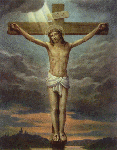
Basic Scripture
By: William G. Most
(c) Copyright by William G. Most, 1993
| HOME |
|---|
CHAPTERS
- Introduction
- A Revolution by Vatican II?
- What is Inspiration ?
- A Revolution by Pius XII?
- Using Genre to defend Inerrancy
- How to Interpret Scripture
- The l964 Instruction of the Biblical Commission
- Which are the Inspired Books?
- The Pentateuch
- Genesis
- Exodus
- Leviticus, Numbers, and Deuteronomy
- Joshua, Judges and Ruth
- Samuel, Kings, Chronicles and Ezra-Nehemiah
- Pre-exilic Prophets
- Exilic and Post-exilic Prophets
- The Psalms
- The Wisdom Literature
- Daniel
- The Two Books of Maccabees
- Judith, Esther, and Tobit
- The Gospels
- The Acts of the Apostles
- St. Paul's Epistles
- The Catholic Epistles
- Study Questions
- Selected Answers
Books/Resources
by Fr. Most
- EWTN Scripture Q & A
- Basic Scripture
- Bible Commentaries
- Our Lady in Doctrine And Devotion
- Outline of Christology
- An Introduction to Christian Philosophy
- The Living God
- The Holy Spirit and The Church
- Catholic Apologetics Notes
Apologetic Resources
- Ask Father
- Biblical Catholicism
- Theology/Philosophy
- Scripture Resources
- Scott Hahns Lectures
- Apologetics Links
Other Services
- Catholic Chaplaincy
- St. Anthony Communications
Chapter 19
The Two Books of Maccabees
Both books are named after Judas Maccabeus, the third son of the priest
Mattathias who began the revolt against Antiochus IV in 167. Antiochus, as
a means of unifying his sprawling empire, tried to spread Greek culture.
This entailed, for the Jews, apostasy from their faith. Many Jews did give
up their faith and took up Greek ways, even building a gymnasium in
Jerusalem; many became martyrs, but many others, led by the Maccabees,
resisted with an army, and made possible the survival of Judaism until the
time of Christ, being the root of the Hasmonean dynasty (which later proved
that power corrupts).
Mattathias was so bold as to kill the king's agent who came to force Jews
to sacrifice to the gods in Modein, his city. Then they fled to the hills,
and other loyal Jews joined them (1 Macc 2:1-28).
Second Maccabees is not a continuation of First Maccabees. Both cover much
of the same period. First Maccabees tells the history, beginning with
Alexander the Great, and from the accession of Antiochus IV in 175, to the
death of Simon Maccabeus in 134.
Second Maccabees covers the same period, but closes with a crucial victory
won by Judas in 165.
First Maccabees relies at least in part on the recollections of those who
had been witnesses of the events. The idea of the genre of history seen in
it is closer to ours than are the books of Samuel, Kings and Chronicles.
Its message is that keeping the law brings blessings and divine support.
Second Maccabees, after an introduction by the author, explicitly says that
it is summarizing a five volume work of Jason of Cyrene (mentioned in
2:23). The author refers us to the fuller work of Jason for more details
(2:28). Here the genre is also history, but closer to the rhetorical type
of history which permits perhaps a bit of freedom at times.
First Maccabees was originally written in Hebrew, and shows Hebrew style by
the frequent use of and to connect sentences. We have only the Greek text.
The Hebrew was probably written near the start of the first century B.C.
Second Maccabees is earlier, probably written in Egypt, most likely around
the end of the second century B.C. Its Greek is of good literary quality.
Second Maccabees shows a deep religious spirit. God is given all the titles
form the older books of the Old Testament, with the addition of ho
epiphanes kyrios - the Lord who appears - in contrast to Antiochus
Epiphanes.
A belief in the future life, or at least, resurrection, is entirely clear,
especially in chapter 7, in the narrative of the martyrdom of the mother
and her seven sons, and also in 14:46.
There is more testimony to the same belief in the account in 12:38-46, of
the fallen Jewish soldiers who had pagan amulets on them. Judas took up a
collection to have sacrifice offered in the Temple for their souls - thus
giving a testimony to a belief in purgatory.
In the same spirit, we see the dream of Maccabeus showing that the deceased
Jeremiah and Onias were praying for the living: 15:11-16.
Of especial interest is the account in 2:1-8 of Jeremiah hiding the ark,
and telling his followers later it was to be hidden until God gathers his
people together again and shows mercy. (Let us recall the translation we
proposed above for Daniel 12:7). But we must not overlook the fact that 2:1
says we will "find this incident in the records". So inspiration merely
guarantees that the story was in some records - it does not guarantee that
the episode is true in itself.
The death of Antiochus is told in chapter 9, out of sequence, for the sake
of grouping of material.
Finally in 6:13-16 we read the fullest account of the frequent Scriptural
theme of filling up the measure of sins. The author is meditating on the
fact that they are so afflicted by the persecution, and says: "It is a sign
of great kindness not to let the irreverent run a long time, but to punish
them at once. In handling other peoples, the Lord in long-suffering waits
until they reach the full measure of their sins before He punishes them.
But with us He acts differently, so that He may not have to punish us more
severely later when our sins would reach their fullness". This same theme
appears many other times in Scripture: cf. Genesis 15:16; Mt. 24:12; 1 Cor
11:32; 1 Ths 2:15-16.